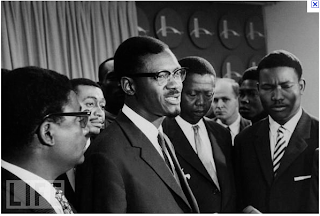Whenever I read about the US government's assassination of Patrice Lumumba, the first democratic leader of Congo, I get very angry. America must eventually stand before the World Court or some other authority and answer for its many crimes against Africa, African Americans, and Black World generally. GI
 |
Patrice Lumumba (2 July 1925 – 17 January 1961). Photo credit: life.com |
January 16, 2011
An Assassination’s Long Shadow
By ADAM HOCHSCHILD (for the New York Times)
San Francisco
TODAY, millions of people on another continent are observing the 50th anniversary of an event few Americans remember, the assassination of Patrice Lumumba. A slight, goateed man with black, half-framed glasses, the 35-year-old Lumumba was the first democratically chosen leader of the vast country, nearly as large as the United States east of the Mississippi, now known as the Democratic Republic of Congo.
This treasure house of natural resources had been a colony of Belgium, which for decades had made no plans for independence. But after clashes with Congolese nationalists, the Belgians hastily arranged the first national election in 1960, and in June of that year King Baudouin arrived to formally give the territory its freedom.
“It is now up to you, gentlemen,” he arrogantly told Congolese dignitaries, “to show that you are worthy of our confidence.”
The Belgians, and their European and American fellow investors, expected to continue collecting profits from Congo’s factories, plantations and lucrative mines, which produced diamonds, gold, uranium, copper and more. But they had not planned on Lumumba.
A dramatic, angry speech he gave in reply to Baudouin brought Congolese legislators to their feet cheering, left the king startled and frowning and caught the world’s attention. Lumumba spoke forcefully of the violence and humiliations of colonialism, from the ruthless theft of African land to the way that French-speaking colonists talked to Africans as adults do to children, using the familiar “tu” instead of the formal “vous.” Political independence was not enough, he said; Africans had to also benefit from the great wealth in their soil.
With no experience of self-rule and an empty treasury, his huge country was soon in turmoil. After failing to get aid from the United States, Lumumba declared he would turn to the Soviet Union. Thousands of Belgian officials who lingered on did their best to sabotage things: their code word for Lumumba in military radio transmissions was “Satan.” Shortly after he took office as prime minister, the C.I.A., with White House approval, ordered his assassination and dispatched an undercover agent with poison.
The would-be poisoners could not get close enough to Lumumba to do the job, so instead the United States and Belgium covertly funneled cash and aid to rival politicians who seized power and arrested the prime minister. Fearful of revolt by Lumumba’s supporters if he died in their hands, the new Congolese leaders ordered him flown to the copper-rich Katanga region in the country’s south, whose secession Belgium had just helped orchestrate. There, on Jan. 17, 1961, after being beaten and tortured, he was shot. It was a chilling moment that set off street demonstrations in many countries.
Read entire essay @ In Congo, an Assassination’s Long Shadow - NYTimes.com
tags: congo, central intelligence agency, belgium, geopolitics
Also dig:
- The Canadian Press: War-crimes charges to be filed 50 years after Lumumba's assassination
- The DR Congo at 50- "I would like to become white"
- How America Underdevelops Africa: Death, Plunder, Resistance
- In Search of Enemies by John Stockwell
- Africa: a continent drenched in the blood of revolutionary heroes | Victoria Brittain development | guardian.co.uk
- We Charge Genocide: The Historic Petition to the United Nations for Relief from a Crime of the United States Government against the Negro People by Civil Rights Congress
No comments:
Post a Comment